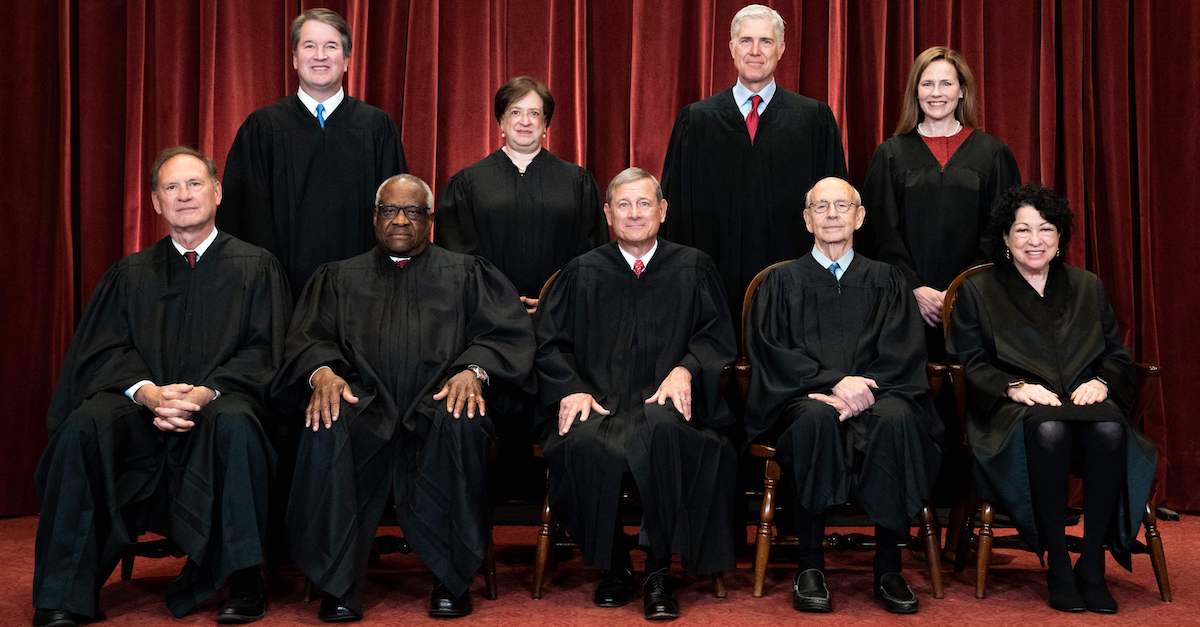
Seated from left: Associate Justice Samuel Alito, Associate Justice Clarence Thomas, Chief Justice John Roberts, Associate Justice Stephen Breyer and Associate Justice Sonia Sotomayor, standing from left: Associate Justice Brett Kavanaugh, Associate Justice Elena Kagan, Associate Justice Neil Gorsuch and Associate Justice Amy Coney Barrett pose during a group photo of the Justices at the Supreme Court in Washington, DC on April 23, 2021.
The Supreme Court of the United States on Monday agreed to take up a case involving three Muslim American men who accused the FBI of unlawfully using a paid confidential informant to indiscriminately surveil the Southern California Muslim community in the years following the 9/11 attacks.
The conservative high court will review the more liberal Ninth Circuit’s ruling reviving the men’s lawsuit, following its dismissal on state secrets grounds.
When Robert Mueller headed the FBI back in 2006, the bureau sent a confidential informant named Craig Monteilh to one of the region’s largest mosques, where Monteilh publicly converted to Islam. He then spent the next 14 months “gathering names, telephone numbers, e-mails, backgrounds, political and religious views, travel plans, and other information on hundreds of individuals in the community,” according to the American Civil Liberties Union (ACLU), one of the organizations representing the Muslim men in the case. The group further alleged that Monteilh was directed to gather information on the entire Muslim community, particularly those that appeared to be “the most devout in their religious practices,” rather than focus his efforts on individuals believed to be involved in criminal activity.
The ACLU, along with the Council for American-Islamic Relations (CAIR) and the law firm Hadsell Stormer Keeny Richardson & Renick, sued the FBI, Mueller, ex-Assistant Director of the FBI Los Angeles Field Office Steven Martinez and other agents on behalf of Yassir Fazaga and two other members of the mosque, alleging that they were unlawfully targeted for surveillance due to their religion, in violation of the First Amendment.
A federal district court initially dismissed the suit, citing the state-secret privilege in the Foreign Intelligence Surveillance Act (FISA), which allows the government to refuse to produce evidence of electronic surveillance that would disclose state secrets in civil litigation.
Once the state secret privilege is invoked, courts have generally deferred to the executive branch judgment and excluded that evidence from production requirements. Where such evidence is critical to the plaintiffs’ claims, the case is typically dismissed. The district court did not perform an in camera or ex parte review of the allegedly privileged state secret evidence, dismissing the case.
A three-judge panel on the U.S. Court of Appeals for the Ninth Circuit reversed the district court’s ruling in February 2019, reasoning that FISA displaced the state secrets privilege with respect to electronic surveillance.
“The legal questions presented in this case have been many and difficult,” Circuit Judge Marsha Berzon, a Bill Clinton appointee, wrote for the panel on February 28, 2019. “We answer them on purely legal grounds, but of course realize that those legal answers will reverberate in the context of the larger ongoing national conversation about how reasonably to understand and respond to the threats posed by terrorism without fueling a climate of fear rooted in stereotypes and discrimination.”
After the Ninth Circuit rejected a request for an en banc review of the case, acting U.S. Solicitor General Jeffrey B. Wall appealed to the Supreme Court, arguing that the ruling undermined the government’s duty to protect sensitive information vital to national security.
The high court is set to hear FBI v. Fazaga in its next term.
[image via ERIN SCHAFF/POOL/AFP via Getty Images]